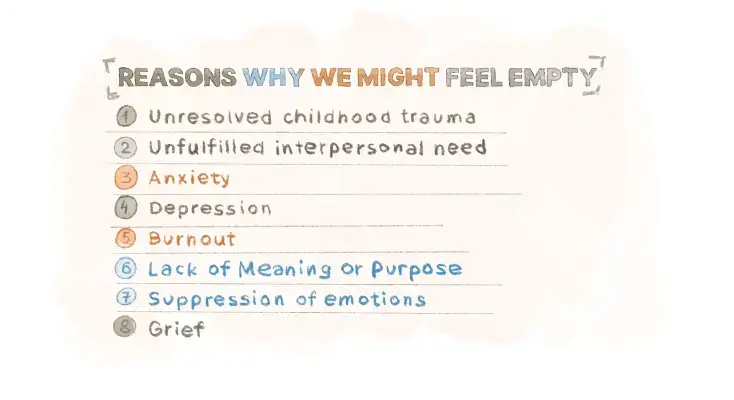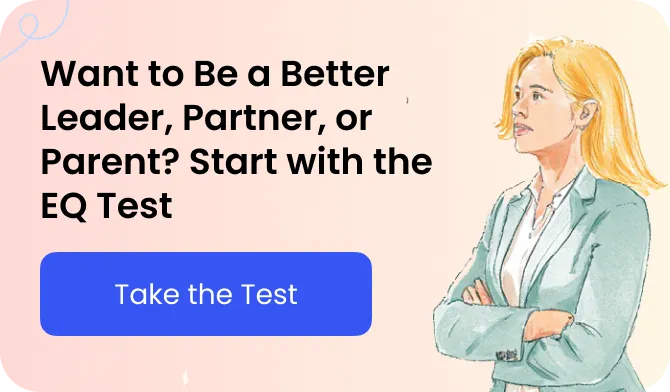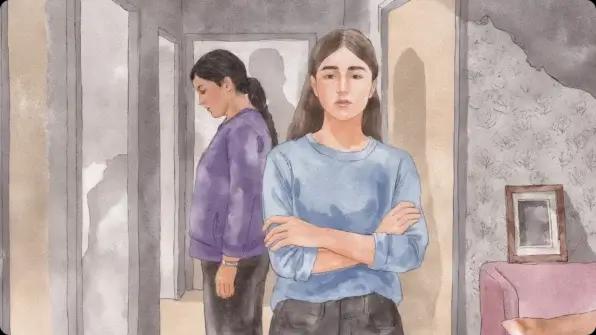Have you ever felt a strange, all-encompassing feeling like a void or a hollow feeling in the chest? Emotional emptiness is a pervasive feeling of numbness or lack of fulfillment.
It can stem from experiences like neglect, loss, or prolonged stress, leaving a person feeling hollow or disconnected. When this emotional emptiness occurs repeatedly, it can lead to a profound sense of dissatisfaction and depression, even borderline personality disorder.
What is emotional emptiness?
To understand what feeling empty means, we need to look at things from all angles.
For instance, research defines it as “a complex, negative emotional state that is experienced in different ways by different individuals. This feeling includes a physical or bodily component, a component of aloneness or social disconnectedness, and a component of a deep sense of personal unfulfillment or lack of purpose.” [1]
Overall, emptiness is a feeling that might include many different emotions, from being bored or lonely to feeling numb to feeling disconnected from self and others.
Also, according to the same study, feelings of emptiness are linked to depression, ADHD, c-PTSD, and schizotypal personality disorder (StPD). Plus, constant feeling like you are empty inside can be a sign of borderline personality disorder. [1]
In summary, it is a blend of sensory and emotional deprivation. What causes one person to feel empty may be vastly different for another, but at its core, it usually represents an unmet emotional need or deeper psychological unease.
Is it depression or just emptiness? How to tell the difference
You can think of those words as referring to the same mental state. There is a significant overlap between feeling empty and experiencing depression. Moreover, both of them can be answers to the question, “Why am I so unhappy?”
It is possible for a person to feel empty as a symptom of depression or, conversely, for someone experiencing a sense of emptiness to fall into a depressive episode eventually.
Generally, depression is a mental health condition that has many symptoms, such as
- feeling down and hopeless all the time
- sleeping too much or too little
- being unable to concentrate
- feeling unmotivated and lacking energy
- anhedonia, loss of interest in activities one used to enjoy
- feeling guilty or “not good enough”
- self-loathing
Another sign of depression could be a feeling of emptiness or numbness.
Reasons why you feel empty and emotionally numb
It’s time to break down these complex human feelings. Here are some reasons you might be asking yourself, “Why do I feel empty?” and some ideas from mental health professionals on how to fill those gaps.

Mental and emotional reasons you feel empty inside
1. Loneliness
Centuries ago, Aristotle said, “Human beings are social by nature.” Today’s neuroscience agrees with that idea, too. [2]
It’s easy to lose your sense of purpose and feel empty when you’re alone, isolated from others, or like you don’t belong. Loneliness is a severe issue in the U.S., affecting more than 1 in 3 Americans. [3]
2. Unresolved childhood trauma
Childhood trauma, whether from a single incidence or a prolonged period of difficulty (c-PTSD), can create a profound sense of emptiness. It shatters one’s trust in the world, making it difficult to find joy or fulfillment in adult life.
For example, you may have learned to feel numb after blaming yourself with the question, “Why am I so emotional?” It could be your way of dealing with too many strong feelings when you were young.
3. Lack of meaning or purpose
A life devoid of purpose is like a ship without a compass, aimlessly wandering the vast ocean of time. It’s no surprise that a lack of clear objectives can lead to feelings of emptiness and constant questioning, “Why do I feel so lost?” A common symptom of emptiness is the feeling that life lacks meaning.
A world-known example is psychologist Viktor Frankl. During the years he spent in Nazi concentration camps, he understood that people need to find meaning in their lives, even when their environment is a constant stress and threat.
So, he came up with his own therapy to help people find meaning in all parts of their lives. He called it logotherapy, which comes from the Greek word logos, which means “meaning.”
4. Suppression of core emotions
Sometimes, we suppress our human emotions instead of dealing with them. Psychoanalyst Anna Freud came up with the idea of repression. She said it is a way for the ego to protect itself from stress. Suppressing emotions is a survival mechanism we develop to cope with overwhelming situations and unpleasant feelings.
However, when this becomes habitual, it leads to a disconnect from ourselves and our innermost feelings, which eventually leads to feelings of numbness and emptiness.
Mental health problems like major depression and general anxiety disorder are often made worse by repressing emotions. A person’s repressed emotions also need to come out and fill that emptiness, so there is a higher risk of substance use disorders and eating disorders.
6. A symptom of borderline personality disorder
Borderline Personality Disorder (BPD) is a serious mental health condition mainly defined by instability in mood, relationships, and one’s sense of self. As well as struggles with impulsivity, anger, suicidal, and self-injurious behaviors.
People with BPD may experience extreme emotional swings—love and hate, innocence and guilt—often on a completely different reality axis than everyone around them.
According to the Diagnostic and Statistical Manual of Mental Disorders (DSM-5), one of the nine requirements for a diagnosis of BPD is having persistent feelings of emptiness. [4] A study on a college group found that feeling empty and having trouble with identity were linked to self-destructive behaviors and what may drive them. [5]
7. Grief and loss
The loss of a loved one, a way of life, or an unfulfilled desire can be a profound, shattering experience—one that can significantly alter their relationship with the world and themselves.
Although everyone feels grief, how it shows up is different depending on the person. The void left in the wake of loss often manifests as an emotional numbness that replaces what was once a source of joy.
Physical reasons
The reasons for that can be exhaustion, burnout, constant lack of sleep, and not a sufficient amount of physical movement.
1. Constant stress and anxiety
Whether it’s academic pressure, financial worries, or the constant stream of social media, these factors can contribute to a feeling of emptiness and numbness.
Prolonged stress can dysregulate the hypothalamic-pituitary-adrenal (HPA) axis, which governs the release of stress hormones like cortisol. [6] Cortisol levels that are consistently high or fluctuate abnormally can cause physical and emotional exhaustion. This, in turn, can manifest as feelings of emptiness.
2. Lack of healthy sleep
A lack of quality sleep or chronic sleep deprivation disrupts the brain’s ability to repair and reset. As a result, neurotransmitters like serotonin may be made less, and inflammation may rise. [7] Both of these effects can make you feel emotionally empty and detached.
3. Burnout and emotional exhaustion
In our ever-increasing pursuit of productivity and success, burnout has become endemic. A survey from June 2023 found that 22% of employees in the United States rated their current level of burnout as high or very high. [8]
The millennial and Gen Z work ethics bear the burden of a socio-economic climate that’s less forgiving than that that nurtured previous generations. A life characterized by “hustle culture” can leave youth feeling as though they must always be working, achieving, and producing.
What to do when you feel empty—Tips
1. Take care of your mental state
The first step toward healing is recognition. Accepting and expressing your emotions, even the painful ones, can be profoundly liberating.
Examine your emotions that suppressed
Suppose you grew up in a dangerous and violent environment. In that case, you may have felt like you had to cut yourself off from what was going on and deal with it by avoiding or suppressing emotional responses, leaving feelings of emptiness and numbness.
Try setting a 5-minute timer and noting your feelings. Write “bored,” “distracted,” or “curious.” If you need help labeling your emotions. Daily practice of these exercises can lead to deeper and longer self-explorations.
If you feel empty because of grieving, the prescribed course of action is to lean into grief. If you recognize that your sentiments are related to a loss, give yourself time to grieve. Everyone grieves differently, and there are no right or wrong methods.
You also can try the active expression of pain through art, support groups, or conversational therapies, which is healing. Accepting loss can fill the void with memories and meaning.
Therapy
Through trauma-focused therapy like EMDR or CBT, you can process and integrate these traumatic experiences. It might help you find a sense of wholeness and renewed hope.
Several studies have shown that dialectical behavior therapy and psychodynamic therapy can help young people develop stable feelings of self-identity and make these empty feelings less severe. [9]
Journaling
Journaling can help clear out negative thoughts about cheating and rediscover what sparks joy. You might begin by using prompts or by writing about your “I am empty” feelings:
- How old is your emptiness? When does the feeling come up first?
- When I am feeling empty, what feelings arise?
- Do I often feel empty in specific locations or during specific times?
- When I most feel empty, what observations about my surroundings?
- When I am empty, what kind of ideas pass through me?
Need help with what to write? Breeze offers a solution: a self-discovery app with an effective journaling solution for your mood and thoughts, with prompts that help you start and persist in your new habit.
2. Prioritize physical wellness
Yes, addressing burnout is not about taking a vacation; it’s about restructuring one’s life to value personal time and set boundaries. By changing your lifestyle and incorporating new habits, you can address other physical reasons for feeling empty inside.
Take good care of yourself
Good self-care sends your mind signals that you deserve to be taken care of and that your life has value.
- Make sure you are spending enough time on your fundamental needs, such as eating, sleeping, exercising, and leisure.
- Try 30 daily minutes of exercise.
- Eat a well-balanced diet, including lean proteins, fruit, vegetables, and whole grains.
- Spend eight hours nightly sleeping.
- Walk at least 5k steps daily.
Practice mindfulness meditation
So, how can we not feel empty for these reasons? Mindfulness is not just a buzzword; it’s a way of reclaiming one’s present and, by extension, one’s life. The practice of mindfulness entails enjoying each moment and eradicating regrets and anxiety regarding the past.
Starting a meditation session, choose a peaceful area, close your eyes, and concentrate on your breathing. Through your meditation, try to catch your emptiness. Where does this feeling live? Try to feel it without escaping it. How do you feel after you understand that feeling? Is it going away after noticing?
Grounding exercise
Grounding exercises, such as the 333 rule, can also help. If you feel hollowness engulfing you, it can bring you back to the present moment in the real world, including your body and the world around you.
Here you need to:
- Name three things you see. Things like a tree outside your window or a laptop screen can be these.
- Name 3 sounds you hear. It may encompass the melodious chirping of birds, an unusual conversation on television, or the exuberant shouts of children outdoors.
- Move three body parts. For example, elevate your hands, rub your nose, or take a step forward. Try to feel your body.
3. Rediscover your life’s true calling
Your values reflect your priorities. These traits shape your character and decisions. In other words, your values shape your purpose and identity. Values fluctuate throughout time. Sometimes, emptiness indicates your career, social, or personal life doesn’t match your values.
Start reconnecting with your values by listing 10–15 words that resonate. Professor and researcher Brené Brown’s checklist of values will help you start:
- Creativity, Fun, Risk-taking, Friendship, Love
- Curiosity, Knowledge, Learning
- Diversity, Integrity, Equality
- Efficiency, Initiative, Independence, Growth, Leadership, Making a difference, Responsibility
- Personal fulfillment, Power, Order
- Faith, Forgiveness, Peace, Patience, Loyalty
- Family, Harmony, Financial stability, Parenting, Patriotism, Safety, Tradition
- Harmony, Love, Optimism
- Health, Leisure, Time
- Honesty, Openness, Freedom, Dignity
After choosing your values, describe them in action. Does your daily life resemble these words? If not, you know where to focus your improvements to feel full. In Dare to Lead, Brown urges readers to “translate values from ideals into behaviors.” Her book is about work, but the sentiment applies to personal life, too.
4. Nurture your relationships with loved ones
It is important to build healthy relationships (not toxic relationships) that make you feel good. This might involve setting boundaries with toxic people and deepening existing romantic and platonic relationships.
Or seeking new connections through support groups or shared interest communities. Furthermore, research has demonstrated that spending time with family and friends can also contribute to stress reduction and a more profound sense of belonging. [10]
A word from Breeze
Sources used
- Harv Rev Psychiatry. 2020. The Feeling of Emptiness: A Review of a Complex Subjective Experience
- New APA Poll: One in Three Americans Feels Lonely Every Week
- J Psychiatry Neurosci. 2008 The neurobiology of human social behaviour: an important but neglected topic. Simon N Young
- Biskin RS, Paris J. Diagnosing borderline personality disorder. CMAJ. 2012
- Brickman, L.J., Ammerman, B.A., Look, A.E. et al. The relationship between non-suicidal self-injury and borderline personality disorder symptoms in a college sample. bord personal disord emot dysregul 1, 14 (2014)
- Karin O, Raz M, Tendler A, et al. A new model for the HPA axis explains dysregulation of stress hormones on the timescale of weeks. Mol Syst Biol. 2020
- Krause AJ, Simon EB, Mander BA, et al. The sleep-deprived human brain. Nat Rev Neurosci. 2017
- Statista. Percentage of employees in the United States by current level of burnout as of 2023
- Measuring the shadows: A systematic review of chronic emptiness in borderline personality disorder. Caitlin E. Miller, Michelle L. 2020.
- Cramer D. Satisfaction with a romantic relationship, depression, support and conflict. Psychol Psychother. 2004.
Disclaimer
This article is for general informative and self-discovery purposes only. It should not replace expert guidance from professionals.
Any action you take in response to the information in this article, whether directly or indirectly, is solely your responsibility and is done at your own risk. Breeze content team and its mental health experts disclaim any liability, loss, or risk, personal, professional, or otherwise, which may result from the use and/or application of any content.
Always consult your doctor or other certified health practitioner with any medical questions or concerns
Breeze articles exclusively cite trusted sources, such as academic research institutions and medical associations, including research and studies from PubMed, ResearchGate, or similar databases. Examine our subject-matter editors and editorial process to see how we verify facts and maintain the accuracy, reliability, and trustworthiness of our material.
Was this article helpful?






